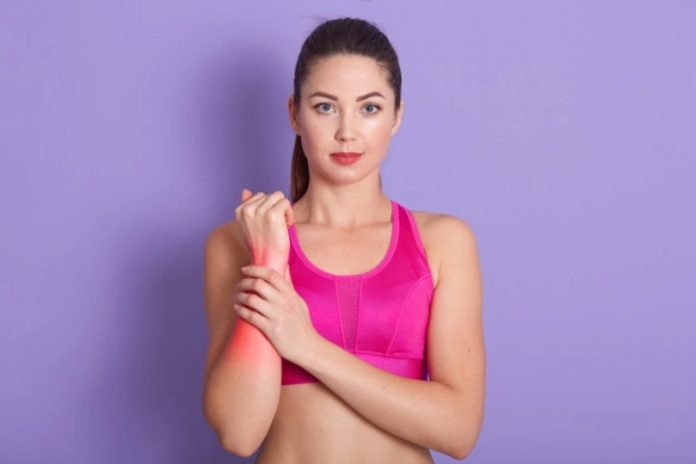Arthritis of the hand commonly affects the base of your thumb, knuckles, second joint, and top joint of your fingers. The most prevalent arthritis are osteoarthritis, rheumatoid arthritis, and psoriatic arthritis. Splints/braces, medicines, steroid injections, and healthy lifestyle choices are all options for treatment. Joint fusion, joint replacement, and tendon transfer are some of the procedures available.
Arthritis is a disease affecting the tissues of the joints. A joint is a point at which two bones unite. Arthritis can damage the lining of your joints and the cartilage at the ends of your bones. The cartilage eventually wears away, exposing the ends of your bones, which scrape against each other and wear away. Because your hand has so many joints, it’s a popular spot for arthritis to develop.
Arthritis of Hands causes discomfort, edema, stiffness, and deformity. As your arthritis worsens, you won’t be able to do the things you used to do with your hands.
Different Types of Arthritis of Hands
There are many more types of arthritis, but these are the most prevalent.
Osteoarthritis of the Hands
The most prevalent type of arthritis is osteoarthritis, commonly known as “wear and tear” or degenerative arthritis. It wears down and breaks down the cartilage (the smooth, cushiony covering at the ends of your bones). The ends of the bones of your hands then rub against one other without protection, causing pain, stiffness, and mobility loss over time. The wrist, the joint at the base of your thumb, and the middle and top (near nails) joints of your fingers are most affected by osteoarthritis. Bony lumps might occur in your finger joints due to long-term sickness.
Rheumatoid Arthritis of the Hands
Rheumatoid arthritis of the hand is an inflammatory disease that mainly causes the lining of the joints of your hands to expand, causing pain, stiffness, and loss of function. It’s an autoimmune illness, which means your immune system assaults healthy tissue in your body. Synovium is the lining of a joint.
The fluid (lubricant) produced by your synovium permits cartilage to slide easily against one other. Inflammation eventually damages the cartilage at the ends of bones, causing the bone to disintegrate. As the tendons and ligaments surrounding the bone weaken and stretch, the joints lose their shape and alignment. The tiny joints of your wrists, hands, and fingers are typically affected by rheumatoid arthritis. On both sides of your body, it frequently affects the same joints. For example, if arthritis affects one hand’s finger joints, it’s likely to impact the other hand’s finger joints as well.
Psoriatic Arthritis of the Hands
Psoriatic arthritis is a type of arthritis that affects the skin and joints (psoriasis). Your fingers start to swell, and you’ll also experience joint discomfort and stiffness in the morning. It resembles rheumatoid arthritis in many ways, and it could simply involve a few fingers.
Risk Factors for Arthritis of the Hand
You may get arthritis of the hand if you are:
- Overweight
- Women
- More than 50
- Previous injuries of Hands
- Inherited genes of arthritis
Symptoms of Arthritis of the Hands
Early symptoms of arthritis of hands include:
- Swollen joints of hands
- Hours or days following increasing hand use, dull or searing joint pain appears
- Stiffness and morning pain of your hands
If arthritis becomes chronic, it may lead to:
- More often, an association of symptoms
- Pain which makes you wake up at night
- Pain causes you to change the way you use your hands
- Dull to sharp pain
- Your fingers could not be fully opened
- Enlargement of your fingers
- Deformation of your fingers
Treatment of Arthritis of the Hand
Treatment options may include:
- Townsville hand therapy
- Medications (such as acetaminophen, NSAIDs, corticosteroids, biological agents)
- Splinting or braces
- Steroid Injections
- Surgery
- Tendon Transfers
Complications of Hand Surgery of Arthritis of the Hand
Hand surgery for arthritis comes with the following complications:
- Mobility hasn’t improved in a long time.
- A broken or worn-out implant must be replaced.
- Bones that do not develop together or line correctly (for fusion surgery).
Conclusion
Arthritis comes with different complications; therefore, it must not be ignored. If you face any symptoms of arthritis of the hand, as mentioned above, you may need to consult an orthopedic as soon as possible. To consult the best orthopedic, visit MARHAM.PK.
Frequently Asked Questions (FAQs)
1- What aggravates the arthritis of the hands?
Arthritis can also be caused by injuries to the hands and wrists, such as broken bones or ligaments or tendon damage. Even if the crack heals, these areas may have become weaker, making them more prone to arthritis in the future.
2- What can I do to stop arthritis from progressing?
Exercising regularly as advised by experts, maintaining a healthy diet, and getting physical therapy are recommended to stop arthritis from progressing.
3- Which nutrients are recommended for arthritis of the hand?
Several nutritionists recommend omega-3 fatty acids to relieve stiffness, pain, and swelling caused by arthritis.
4- What are the benefits of the treatment of arthritis?
There is no cure for arthritis, but medications have vastly improved in recent years. There is a demonstrable benefit in beginning treatment early for many kinds of arthritis, particularly inflammatory arthritis.
















